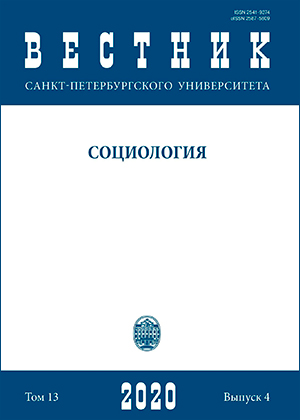Social attitudes of young Petersburgers
DOI:
https://doi.org/10.21638/spbu12.2020.402Abstract
The article presents an empirical analysis of social expectations and attitudes of the modern young generation using the example of St. Petersburg. The study of this phenomenon is based on three studies conducted under the author’s supervision in 1996, 2011 and 2019. The article is based on data from the 2019 study — 153 people. (Saint Petersburg, age group 18–29 years, quota sample by gender, all respondents are of Russian nationality). The questionnaire was compiled using the author’s methods, in particular, the method of symbolic associations with subsequent content analysis of verbal constructs. In the body of the article, the dynamics of changes in the social attitudes of young people is demonstrated based on empirical research data. The change affected the perception of the basic concepts of national identity, such as “Russia”, the “Russian state” and “Russian power”. While there is almost no dynamics in the attitude to Russia as a Homeland, there are significant changes in the opinions towards the state and power. In relation to the government, there was an increase in protest moods, which was found during the content analysis of symbolic associations in the 2019 study compared to the 1996 and 2011 studies. In the historical consciousness of young people there is a positive dynamic of ideas about the pre-revolutionary and Soviet period against the background of the lack of dynamics of ideas about modern Russian society. When comparing “Soviet society” and “modern society”, changes in symbolic associations were recorded in the direction of increasing the number of associations related to human relationships and reducing the number of political associations. The article presents empirical data on the content of the national idea expressed by young people. Illustrative material for the article includes tables and histograms.
Keywords:
social mood, social expectation, national identity, generation, relationships, national idea, state, symbolic association, content analysis
Downloads
References
References
Downloads
Published
How to Cite
Issue
Section
License
Articles of "Vestnik of Saint Petersburg University. Sociology" are open access distributed under the terms of the License Agreement with Saint Petersburg State University, which permits to the authors unrestricted distribution and self-archiving free of charge.




